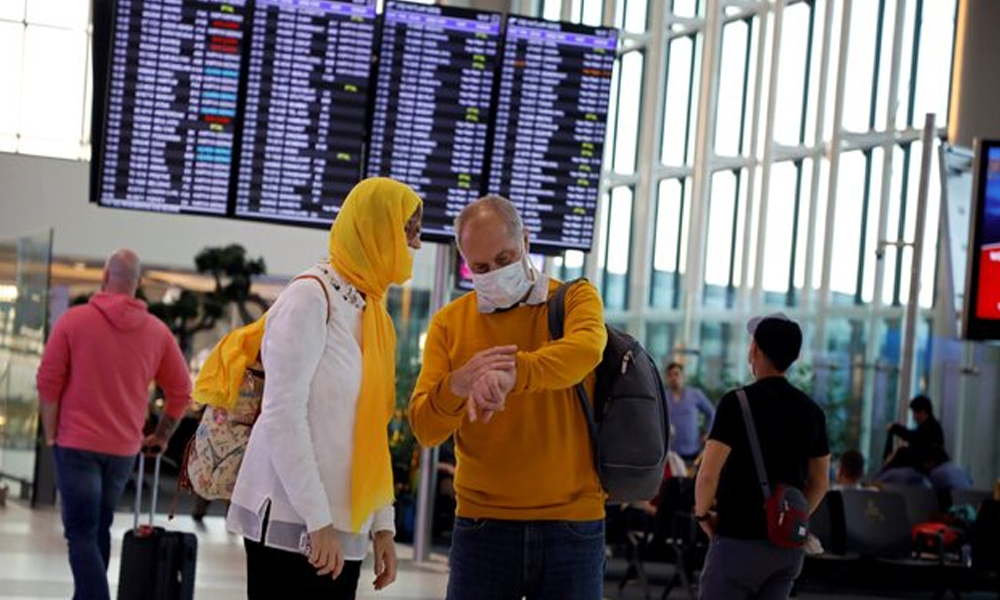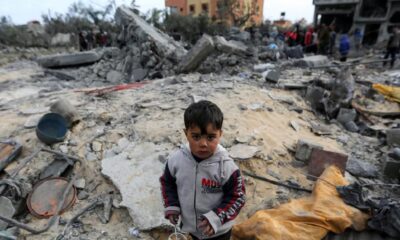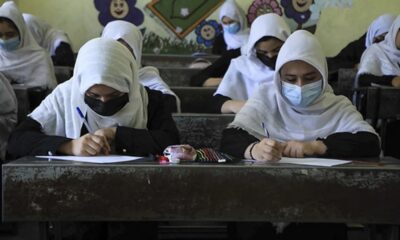COVID-19
Thousands of flights canceled globally as Omicron mars Christmas weekend

Commercial airlines around the world canceled more than 4,500 flights over the Christmas weekend, as a mounting wave of COVID-19 infections driven by the Omicron variant created greater uncertainty and misery for holiday travelers.
Airline carriers globally scrapped at least 2,401 flights on Friday, which fell on Christmas Eve and is typically a heavy day for air travel, according to a running tally on the flight-tracking website FlightAware.com. Nearly 10,000 more flights were delayed.
The website showed that 1,779 Christmas Day flights were called off worldwide, along with 402 more that had been scheduled for Sunday.
Commercial air traffic within the United States and into or out of the country accounted for more than a quarter of all the canceled flights over the weekend, FlightAware data showed.
Among the first U.S. carriers to report a wave of holiday weekend cancellations were United Airlines and Delta Air Lines (DAL.N), which scrubbed nearly 280 flights combined on Friday alone, citing personnel shortages amid the surge of COVID-19 infections.
COVID-19 infections have surged in the United States in recent days due to the highly transmissible variant Omicron, which was first detected in November and now accounts for nearly three-quarters of U.S. cases and as many as 90% in some areas, such as the Eastern Seaboard.
The average number of new U.S. coronavirus cases has risen 45% to 179,000 per day over the past week, according to a Reuters tally.
New York reported more than 44,000 newly confirmed infections on Friday alone, shattering that state’s daily record. At least 10 other states set new one-day case records on Thursday or Friday.
Rising hospitalizations were hitting healthcare systems especially hard in the U.S. Midwest, with intensive care units in Indiana, Ohio and Michigan bracing for the worst even as they remain under pressure from an earlier wave of Delta variant cases.
In Britain, many industries and transport networks were struggling with staff shortages as sick workers self-isolated, while hospitals have warned of the risk of an impact on patient safety.
One in 20 Londoners had COVID-19 last week, a figure that could rise to one in 10 by early next week, according to data released on Thursday by the Office for National Statistics.
Government data showed a record tally of 122,186 new infections nationwide on Friday, marking a third day in which the number of known cases has surpassed 100,000.
While recent research suggests Omicron produces milder illness, and a lower rate of hospitalizations, than previous variants of COVID-19, health officials have maintained a cautious note about the outlook.
“There is a glimmer of Christmas hope … but it definitely isn’t yet at the point where we could downgrade that serious threat,” Jenny Harries, head of the UK Health Security Agency, told the BBC.
France hit another COVID-19 infection record on Friday, with its daily tally exceeding 94,000 while hospitalizations from the virus reached a seven-month high, prompting the government to convene a special meeting for Monday that could trigger new public health restrictions.
Despite the uncertainties and grim news around the world, millions of Americans carried on with travel plans through a second pandemic-clouded holiday season.
Moses Jimenez, an accountant from Long Beach, Mississippi, flew to New York with his wife and three children, even though the latest torrent of coronavirus cases dashed their hopes of catching a Broadway performance of “Hamilton” or visit some museums.
“Hamilton” was one of a dozen productions to cancel shows this week as cast and crew members tested positive for COVID-19. Museums were scratched from the family’s itinerary because many now require proof of vaccination and the two younger children are ineligible for the shot.
Instead, Jimenez, 33, said his brood will make the best of roaming the city’s streets and parks, while also seeing relatives and friends.
“We just wanted to get out of the house, really, get the kids out to the city for Christmas,” Jimenez told Reuters on Thursday at New York’s LaGuardia Airport.
New York planned to sharply limit the number of people it allows in Times Square for its annual outdoor New Year’s Eve celebration, in response to the surge of new coronavirus cases, capping the number of attendees 15,000.
The Biden administration will next week lift travel restrictions on eight southern African countries imposed last month over concerns about the Omicron variant, the White House said.
COVID-19
WHO declares end to COVID global health emergency

The World Health Organization said Friday that COVID-19 no longer qualifies as a global emergency, marking a symbolic end to the devastating coronavirus pandemic that triggered once-unthinkable lockdowns, upended economies and killed millions of people worldwide.
The announcement, made more than three years after WHO declared the coronavirus an international crisis, offers some relief, if not an ending, to a pandemic that stirred fear and suspicion, hand-wringing and finger-pointing across the globe, AP reported.
The U.N. health agency’s officials said that even though the emergency phase was over, the pandemic hasn’t finished, noting recent spikes in cases in Southeast Asia and the Middle East.
WHO says thousands of people are still dying from the virus every week, and millions of others are suffering from debilitating, long-term effects.
“It’s with great hope that I declare COVID-19 over as a global health emergency,” WHO Director-General Tedros Adhanom Ghebreyesus said.
“That does not mean COVID-19 is over as a global health threat,” he said, warning that new variants could yet emerge. Tedros noted that while the official COVID-19 death toll was 7 million, the real figure was estimated to be at least 20 million.
Tedros said the pandemic had been on a downward trend for more than a year, acknowledging that most countries have already returned to life before COVID-19.
He bemoaned the damage that COVID-19 had done to the global community, saying the pandemic had shattered businesses, exacerbated political divisions, led to the spread of misinformation and plunged millions into poverty.
When the U.N. health agency first declared the coronavirus to be an international crisis on Jan. 30, 2020, it hadn’t yet been named COVID-19 and there were no major outbreaks beyond China.
More than three years later, the virus has caused an estimated 764 million cases globally and about 5 billion people have received at least one dose of vaccine.
In the U.S., the public health emergency declaration made regarding COVID-19 is set to expire on May 11, when wide-ranging measures to support the pandemic response, including vaccine mandates, will end. Many other countries, including Germany, France and Britain, dropped most of their provisions against the pandemic last year.
When Tedros declared COVID-19 to be an emergency in 2020, he said his greatest fear was the virus’ potential to spread in countries with weak health systems.
Most recently, WHO has struggled to investigate the origins of the coronavirus, a challenging scientific endeavor that has also become politically fraught.
COVID-19
COVID-19 in Iran: Nearly 900 new cases, 24 deaths recorded

The Iranian health ministry announced on Sunday that more than 890 new cases of COVID-19 have been identified across the country during the past 24 hours, adding that 24 patients have died in the same period of time, Fars News Agency reported.
“A sum of 891 new patients infected with COVID-19 have been identified in the country based on confirmed diagnosis criteria during the past 24 hours,” the Iranian Health Ministry’s Public Relations Center said on Sunday, adding, “454 patients have been hospitalized during the same time span.”
The ministry’s public relations center said 611 people infected with COVID-19 are in critical condition.
COVID-19
China says 200 million treated, pandemic ‘decisively’ beaten

China says more than 200 million of its citizens have been diagnosed and treated for COVID-19 since it lifted strict containment measures beginning in November.
With 800,000 of the most critically ill patients having recovered, China has “decisively beaten” the pandemic, according to notes from a meeting of the ruling Communist Party’s all-powerful Politburo Standing Committee presided over by President and party leader Xi Jinping, AP reported.
China enforced some of the world’s most draconian lockdowns, quarantines and travel restrictions and still faces questions about the origins of the virus that was first detected in the central Chinese city of Wuhan in late 2019. Heavy-handed enforcement prompted rare anti-government protests and took a heavy toll on the world’s second-largest economy.
The official Xinhua News Agency quoted Xi as saying that policies to control the outbreak had been “entirely correct.” The abrupt lifting in November and December of the “zero COVID” policy that had sought to eliminate all cases of the virus led to a surge in infections that temporarily overwhelmed hospitals.
Case numbers have since peaked and life has largely returned to normal, although international travel in and out of China has yet to return to pre-pandemic levels.
China is now transitioning to a post-pandemic stage after a fight against the outbreak that was “extraordinary in the extreme,” Xinhua said.
The government will continue to “optimize and adjust prevention and control policies and measures according to the times and situations with a strong historical responsibility and strong strategic determination,” Xinhua said.
-

 Latest News5 days ago
Latest News5 days agoPakistan once again urges IEA to act against militants
-

 Sport4 days ago
Sport4 days agoAFC Beach Soccer: UAE thrash Afghanistan 7-1 in opener
-

 Regional5 days ago
Regional5 days agoAt least 91 killed in Gaza as Israel abandons ceasefire, orders evacuations
-

 Latest News4 days ago
Latest News4 days agoAmerican freed by IEA reunited with wife, former cellmate, in US
-

 Regional4 days ago
Regional4 days agoIran’s leader says Yemen’s Houthis act independently, warns against US action
-

 Latest News4 days ago
Latest News4 days agoBayat Foundation delivers Ramadan aid to needy families in Bamyan
-

 International Sports3 days ago
International Sports3 days agoBoxing legend George Foreman dies at 76
-

 Latest News4 days ago
Latest News4 days agoEighteen injured after dispute between two brothers in Helmand
























